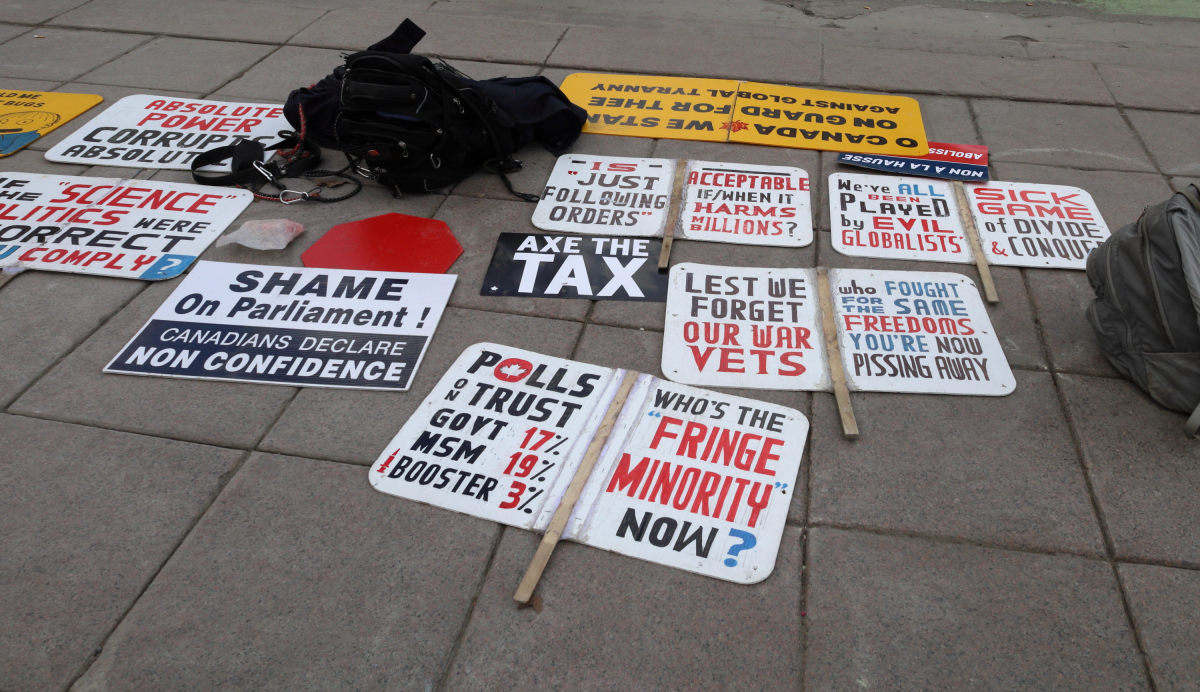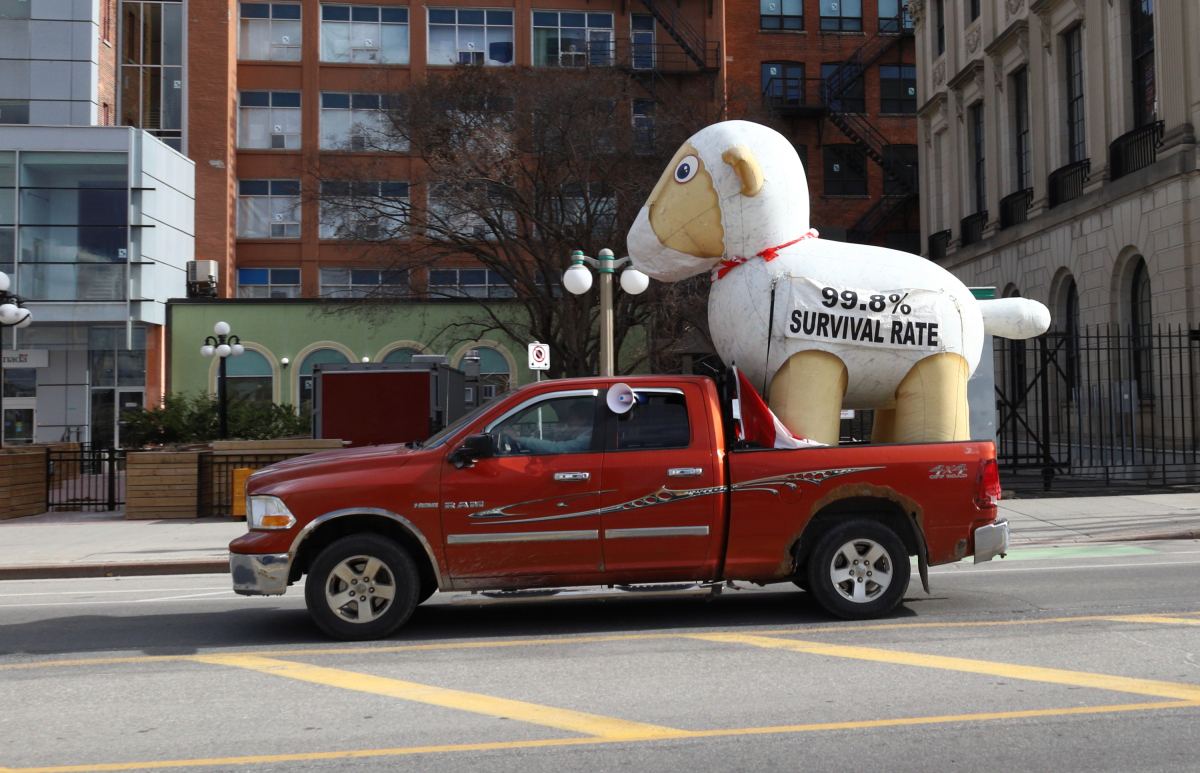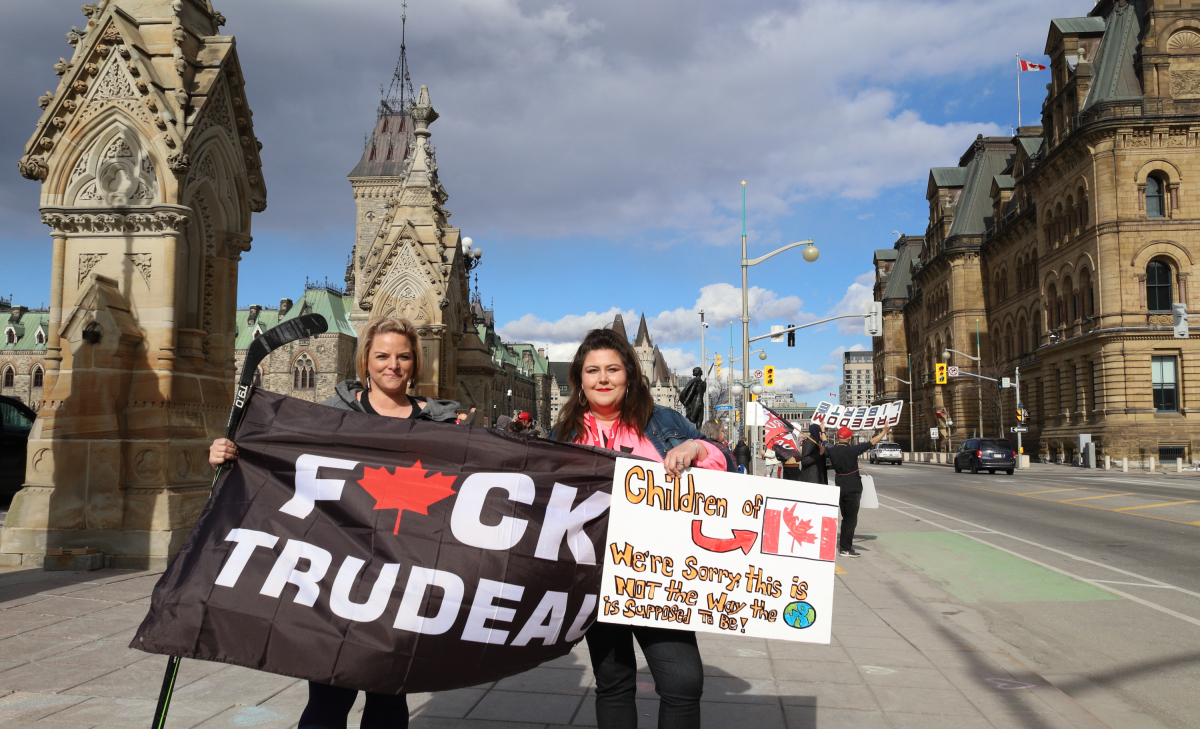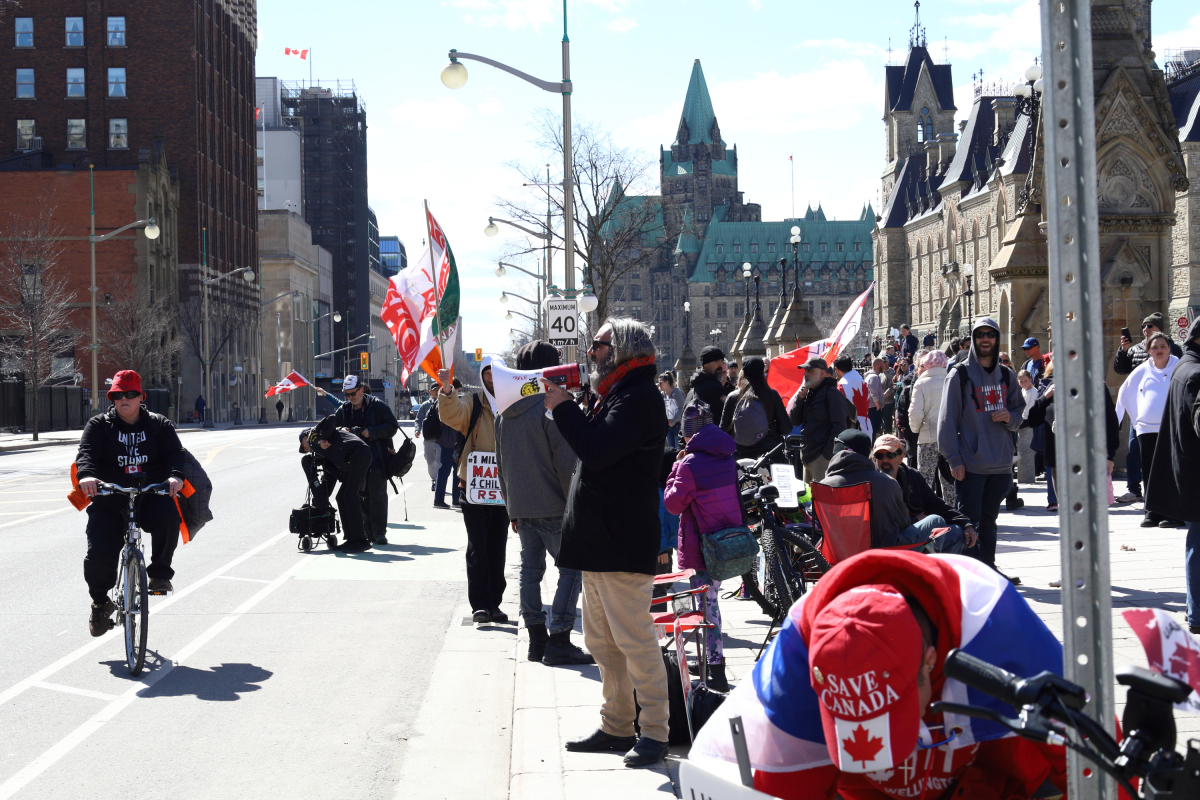Support strong Canadian climate journalism for 2025
A giant inflatable sheep mingled with profanity-laced signs about the federal government, high food prices, inadequate housing and conspiracy theories as people gathered in Ottawa on Monday to protest the carbon price hike.
The protest at Parliament Hill drew less than 100 people, approximately, while other cities like Calgary saw crowds in the hundreds and traffic reduced to one lane on a major highway. About 15 protests were scheduled to take place across Canada, according to the group Nationwide Protest Against Carbon Tax, which organized the actions.
On April 1, the federal consumer carbon levy rose from $65 to $80 per tonne. The increase means a litre of gasoline is up 3.3 cents. The change will apply in every province and territory except British Columbia and the Northwest Territories that have similar pricing systems in place, as well as Quebec, which has its own program.
But other issues bled into Ottawa’s “carbon tax” protest. An orange pickup drove a giant inflatable sheep named “Shelby” up and down Wellington Street with a banner that read, “99.8% survival rate,” referring to the COVID-19 virus and public health measures like vaccines and masking. Other signs read: “O Canada we stand on guard for thee against global tyranny,” “We’ve all been played by evil globalists’ sick games of divide and conquer” and “100% of climate scientists agree with who funds them.” Many Canada flags and “F@#$ Trudeau” and “Axe the Tax” signs populated the protest, along with a handful of signs referencing the “parental rights” movement.


Multiple attendees said they first got involved with government protests during the trucker convoy’s opposition to vaccine mandates in 2022.
Maria Goyette and Ashley Lacombe met during the 2022 “Freedom Convoy” protests and decided to attend the carbon price protest on April 1 together.

“The cost of everything is ridiculous,” said Goyette. “People have to choose between eating or paying rent when it keeps going up and up, and these guys are getting raises and flying around the country and people are starving in Canada, so that's why we're here.”
People, including some they know, are having a hard time putting food on the table and “something’s got to be done,” added Lacombe.
Lacombe does not believe in climate change and said it's just a way for the government to put more money into its pocket.
“I pay taxes on taxes on taxes,” she said after the pair listed all the things they're taxed on, like groceries, fuel and housing.
When asked where on their list of priorities “axing the tax” falls, Goyette gestured toward Parliament and said, “I think the first thing would be to get this asshat out of office. He's our biggest problem.”
While the carbon price was the focal point of this protest, multiple attendees had much more to say about other issues.
“Why does all the focus have to be on carbon right now when there's so many more important things to focus on?” said Diane McCarthy, a 71-year-old Ottawa resident. “You know, housing, addiction, crime, immigration — Oh, forget all that, we're gonna worry about carbon tax. We're gonna worry about 2030… Worry about things now, because there are broken things right now that need fixing before the climate.”
Kate O’Kane attended with her 16-year-old son Malachy and identified “outrageously priced” housing and the “astronomical” cost of living as key issues.

“This increase in tax is gonna make gas go up, groceries go up, housing is gonna go up. Everything is gonna go up,” said O’Kane. “It's gonna be impossible to survive. It's already impossible to survive. It's reaching that point.”
Many attendees said carbon pricing is a significant driver of inflation, pointing to all the ways increased fuel costs might impact the cost of food, for example. Bank of Canada governor Tiff Macklem has repeatedly stated the carbon price’s effect on inflation is quite small, adding about 0.15 percentage points to inflation on an annual basis, or an estimated 0.6 over the carbon price’s lifetime.
As a single mother of five, O’Kane said she is struggling and that her food bill is almost as much as her rent.
“People are living on the streets. They're living in tents. And they're taking all this money, and they're taking it from us,” said O’Kane.
She described the carbon price as “another money grab” and said there are other options like “by growing trees and by working with the environment, as opposed to collecting tax dollars, and hurting the people and then pocketing it.”
In provinces where the federal carbon pricing system applies, Canadian households receive a rebate that, eight out of 10 times, returns more money than is taxed, according to Canada’s Parliamentary Budget Office. The policy’s purpose is to make planet-warming greenhouse gas emissions steadily more expensive to incentivize consumers and companies to invest in or make the switch to cleaner alternatives. The consumer price on carbon is projected to comprise eight to 14 per cent of Canada’s emission reductions by 2030, according to a recent analysis by the Canadian Climate Institute.
“I honestly don't think that climate change is a real thing,” said O’Kane. “I don't think that the CO2 that's being emitted into the air is killing the planet like they're saying. I just don't believe it.”
Many attendees expressed anger and frustration that federal MPs are getting a 4.4 per cent pay increase, effective April 1.
By 4:30 p.m., the crowd on Parliament Hill had thinned out considerably.






Comments
Yes, I was wondering about the overlap between the anti-vaxxers (Freedom Convoy) and the anti-carbon "tax" crowd.
Close to 100%, it seems.
Canada's double-digit IQ contingent. Right-wing ignorantists and troublemakers. Terminally disinformed.
Rebates are in their bank accounts, but not in their vocabulary.
"Hundreds showed up to a demonstration on the Trans-Canada Highway at Highway 22 near Cochrane" (EJ)
"Videos posted on social media show hundreds of cars, trucks, RVs and tractors lined up, mounted with Canadian flags and 'Axe The Tax' signs." (CBC)
The carbon "tax" is not high enough, apparently.
Energy Hogs United, the nation's leading environmental menaces, and legions of fossil-fuelled deniosaurs can still afford to drive their diesel-belching, climate-crashing behemoths to anti-climate action protests.
How about we axe their rebates?
If Poilievre's sheep reject carbon pricing, they should send back their rebates to Ottawa. Put their money where their mouth is.
They won't, of course. Hypocrites.
Some nice phrasing there! This reminds me of "Talking to Americans" on Rick Mercer, and Jordan Klepper's coverage of Trump rallies on the Daily Show; truly cringeworthy.
A lot of racket and chest thumping by a small crowd. Not a single solution to the issues they bemoan, except denial and removal. Typical convoy logic.
Yep. Dumping the carbon tax will bring down housing prices. So will electing Poilievre. Right?
The traditional double digit summer spike in fuel prices by the petroleum monopoly will, no doubt, be blamed on the April 1st marginal step increase in the rebatable carbon tax. Makes a lot of sense, doesn't it?
A couple more steps on this intellectual track and Trudeau will be blamed for the darkness during the upcoming solar eclipse.
Haha, but shockingly true! It's a whole other kind of "Trudeaumania," mania being the key word.
One of the quotes: “We’ve all been played by evil globalists’ sick games of divide and conquer”
Yes, well, they're not wrong about that. Notable among these evil globalists are the fossil fuel companies, pretty much none of which are Canadian owned. In this connnection, one point to note about the carbon tax is that it is considerably smaller (even before everyone gets their money back) than the taxpayer-paid subsidies to fossil fuel companies. So if you want to get some tax money back, how about we axe those subsidies?
What if the carbon tax were axed and the prices of commodities that people complain about, do not fall .. but rise ..
has there ever been a time in anyone’s lifetime when food, house and rents,,fell?